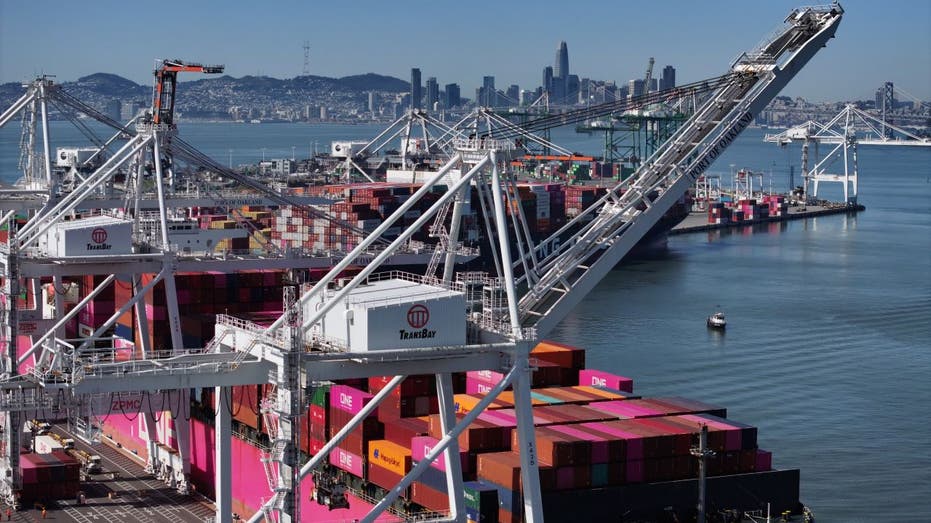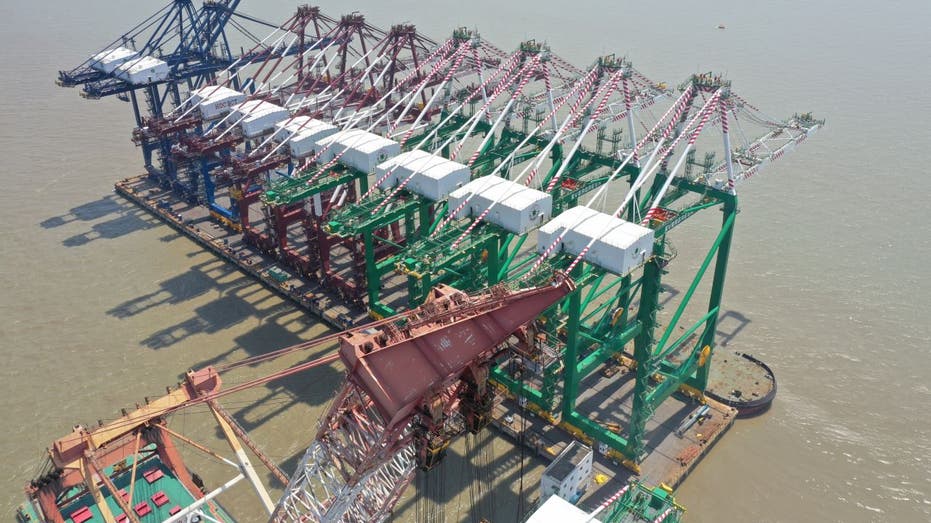Chinese crane firm denies posing security risk at US ports amid investigation
Congress is investigating Chinese shipping crane-maker ZPMC over concerns about potential national security risks
We have seen some very disturbing behavior from Biden when it comes to China: Gordon Chang
Gatestone Institute senior fellow Gordon Chang discusses Bidens remarks on China during the State of the Union, a House bill targeting TikTok and an espionage probe finding communications devices on Chinese cranes at U.S. ports.
A Chinese firm under investigation by Congress over posing a potential cybersecurity threat at U.S. ports said that its cranes don't pose a national security risk.
Shanghai Zhenhua Heavy Industries (ZPMC) is under investigation by the House Select Committee on the Strategic Competition between the U.S. and the Chinese Communist Party and the House Homeland Security over its installation of equipment onto ship-to-shore (STS) cranes bound for U.S. ports.
"ZPMC takes the U.S. concerns seriously and believes that these reports can easily mislead the public without sufficient factual review," the company said in a filing. "The cranes provided by ZPMC do not pose a cybersecurity risk to any ports."
Lawmakers wrote to the company at the end of February and informed the company that they identified "serious concerns" about ZPMC's relationship with the CCP. They noted that some cellular modem components found installed on cranes that "do not appear in any way to contribute to the operation of the STS cranes or onshore infrastructure, raising significant questions as to their intended applications."
BILL BANNING TIKTOK APP HEADED TO HOUSE AFTER UNANIMOUS COMMITTEE VOTE

Shipping cranes owned by Chinese firm ZPMC have raised security concerns over ties to the CCP given their presence in ports like Oakland. (Photo by Justin Sullivan/Getty Images / Getty Images)
The congressional letter to ZPMC noted that, "In 2021, the Federal Bureau of Investigation (FBI) discovered intelligence gathering equipment on board a vessel delivering ZPMC cranes to the Port of Baltimore."
The letter added that ZPMC "accounts for nearly 80 percent of the ship-to-shore (STS) cranes in use at U.S. maritime ports" and that many of those cranes were built in an area adjacent to a shipyard "where the [People's Liberation Army Navy's] most advanced warships are built, including the PRC's third aircraft carrier and its fleet of Type 055 and Type 052 destroyers."
"The Committees have serious concerns that this proximity to the PLAN's main shipyard provides malicious CCP entities, including its intelligence agencies and security services, with ample opportunity to modify U.S.-bound maritime equipment, exploit it to malfunction, or otherwise facilitate cyber espionage thereby compromising U.S. maritime critical infrastructure," the letter continued.
FORMER GOOGLE ENGINEER INDICTED FOR STEALING AI SECRETS TO AID CHINESE FIRMS

The House CCP Select Committee noted that many ZPMC cranes are built in close proximity to the Chinese Navy's most advanced shipyard. (Photo by Dickson Lee/South China Morning Post via Getty Images / Getty Images)
ZPMC installed equipment from Swiss engineering group ABB onto STS cranes used at U.S. ports. ABB has said it sold control and electrification equipment to many crane manufacturers, including Chinese companies that in turn sold cranes to U.S. ports.
The letter noted that the committees learned in briefings with U.S. ports and federal law enforcement agencies that ZPMC and ABB have "repeatedly made requests for remote access to U.S.-based STS cranes and other U.S. maritime infrastructure components."
TIKTOK FACES BAN IN BIPARTISAN BILL IF BYTEDANCE DOESN'T DIVEST OWNERSHIP

Aerial view of the Changxing base, one of the largest production base of Shanghai Zhenhua Heavy Industries Co., Ltd. (ZPMC). (Photo by Shen Chunchen/VCG via Getty Images / Getty Images)
The lawmakers asked ZPMC to explain whether any Chinese government entities, including intelligence or security agencies, have ever requested that ZPMC obtain remote access to U.S.-based STS cranes.
The House Select Committee on the CCP sent a letter to ABB in July 2023 requesting documents and information about its relationship with ZPMC.
It sent ABB a follow-up letter in January 2024 to request that its U.S. affiliate testify in a public hearing and said the company has "failed to cooperate in good faith" with the probe and "has lacked the appropriate urgency in responding to calls for increased security."
GET FOX BUSINESS ON THE GO BY CLICKING HERE
ABB told FOX Business in a statement that, "Since July 2023, ABB has engaged with the U.S. House of Representative Committee on Homeland Security and the Select Committee on the Strategic Competition between the United States and the Chinese Communist Party as they research port security issues."
"We take the Committees' requests seriously. We disagree with the characterization of ABB's work in the port sector," the statement concluded.
Reuters contributed to this report.




















